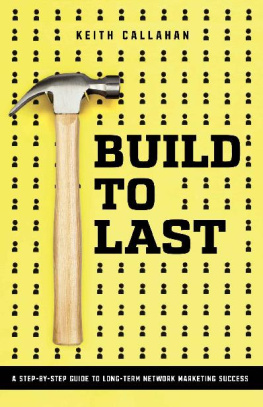Small Steps
BOOK 1
Small Steps
The First 100 Pounds You Gotta Think Right
KEITH TEMPLE TROTTER

New York
Book 1
100 Small Steps
The First 100 Pounds You Gotta Think Right
2015 Keith Temple Trotter. All rights reserved.
All rights reserved. No portion of this book may be reproduced, stored in a retrieval system, or transmitted in any form or by any meanselectronic, mechanical, photocopy, recording, scanning, or otherexcept for brief quotations in critical reviews or articles, without the prior written permission of the publisher.
Published in New York, New York, by Morgan James Publishing. Morgan James and The Entrepreneurial Publisher are trademarks of Morgan James, LLC. www.MorganJamesPublishing.com
The Morgan James Speakers Group can bring authors to your live event. For more information or to book an event visit The Morgan James Speakers Group at www.TheMorganJamesSpeakersGroup.com.
ISBN 978-1-63047-180-4 paperback
ISBN 978-1-63047-181-1 eBook
ISBN 978-1-63047-182-8 hardcover
Library of Congress Control Number:
2014937577
Cover Design by:
Rachel Lopez
www.r2cdesign.com
Interior Design by:
Bonnie Bushman

In an effort to support local communities, raise awareness and funds, Morgan James Publishing donates a percentage of all book sales for the life of each book to Habitat for Humanity Peninsula and Greater Williamsburg.
 | Get involved today, visit www.MorganJamesBuilds.com. |  |
Dedication
To my children, who I love enough to want to be healthy and whole for. To my editor Eric Vollen for being gentle with this first time author, and to my SCCC Crew. Thanks for buying into being healthy enough to enjoy your vices.
Contents
Foreword
For anyone who has contemplated making a meaningful change in their life, you know that behavior change, and in particular weight loss, doesnt happen easily. In book 1 of 100 Small Steps, my friend Mr. Keith Temple Trotter invites the reader to join him as he breaks down his weight loss experience into digestible bites.
Keith and I were introduced to one another during my work as a medical director at a regional health plan where he was also employed. At the time, I was piloting an effort at our mutual employer in partnership with Activ8 Mobile to address health through a holistic mind-body-spirit approach addressing awareness, choice, and accountability in our daily life. The day we met, Keith shared his story of 100 Small Steps with me over lunch. He spoke of how he had figured out a way to address his own habits that were unhealthy and was well on his way to his current weight and healthier life. What he shared with me that day was nothing short of inspirational.
Throughout my 16-year career as a family physician I have been struck by how difficult it can be for individuals to change habits for the benefit of their health. Early on as a young physician, day after day, I would tell my patients with diabetes, obesity, and many other risk factors to change their lifestyle if they wished to avoid significant health problems down the road. As my practice evolved it became more and more apparent, not surprisingly in hindsight, that my approach was not overly successful. I had focused on managing chronic disease with appropriate prescription therapy yet wanted so badly to help through lifestyle intervention and removing physical barriers to activity. My own journey of learning how to support my patients in their lifestyle choices was humbling as I discovered how little I knew about making these difficult changes.
Since that time, I have walked alongside and supported many individuals in their efforts to change daily eating and activity habits as well as those who have successfully improved their health through weight loss, improved fitness, lowered blood pressure, and improved cholesterol results. While their personal gainphysically, emotionally, and financiallyis important, the impact they are having on those around them, their children, and our healthcare system is not trivial. Poor behaviors in areas such as nutrition, physical activity, stress management, and tobacco use are contributing to chronic illnesses and unsustainable expenses in our healthcare system. These expenses ultimately are paid by you through higher health insurance premiums needed to cover the rising costs of caring for the population.
In the United States today, according to the Centers for Disease Control (CDC) 2009-10 data, 35.7 percent of adults were obese and 16.9 percent of children were obese. In addition, $149 billion spent on healthcare in 2008 were directly related to obesity. The average obese adult spent $1,429 dollars more on healthcare than their normal weight counterparts. The CDC reports:
More than one-third of all adults do not meet recommendations for aerobic physical activity based on the 2008 Physical Activity Guidelines for Americans, and 23 percent report no leisure-time physical activity at all in the preceding month.
In 2007, less than 22 percent of high school students and only 24 percent of adults reported eating five or more servings of fruits and vegetables per day.
Many organizations currently are addressing and will continue to address population health by providing opportunities for you to improve your own health habits through policy changes, employer sponsored wellness programs and incentives, physician or provider-led services, among others. In spite of these efforts, finding your individual desire to make sustainable changes in your own life based on what is important to you will be more effective than any organizations efforts.
This is why 100 Small Steps is so important. The authentic nature of how Keith shared his experiences with me at lunch was inspiring and thought-provoking and shows up powerfully in this text. His approach is practical and shows how several simple, achievable actions lead to a significant impact on ones health. Most important, he shares his aha moment that allowed him to get past his own self defenses that were protecting him from seeing his own state of health. Do you know of someone else who had their aha moment? Have you missed yours or intentionally avoided it like Keith did for so long?
Trotter focuses on some common themes through the book; food is fuel and should not be confused with something to sooth emotional distress, needing to be honest with oneself and identify where you are creating self-protective barriers to self-honesty. He shares real examples that are raw and authentic in discussing the role of social support and addressing mental health.
Those who are successful tend to have a few things in common: achieving awareness of their own condition or state, setting a clear goal, and choosing small sustainable steps that continue to move them towards achieving that goal.
As a result, I am excited and honored to be writing the foreword to Trotters book. Throughout my healthcare career Ive seen the need as well as the difficulty in enacting behavior change: one on one during patient care, working at a health plan with a focus on employer health, and now with a large retail health care provider. My own career path has led me closer to where individuals make their daily decisions, where they buy their groceries, fitness equipment and apparel, prescription medication, as well as over-the-counter products for self-care.













